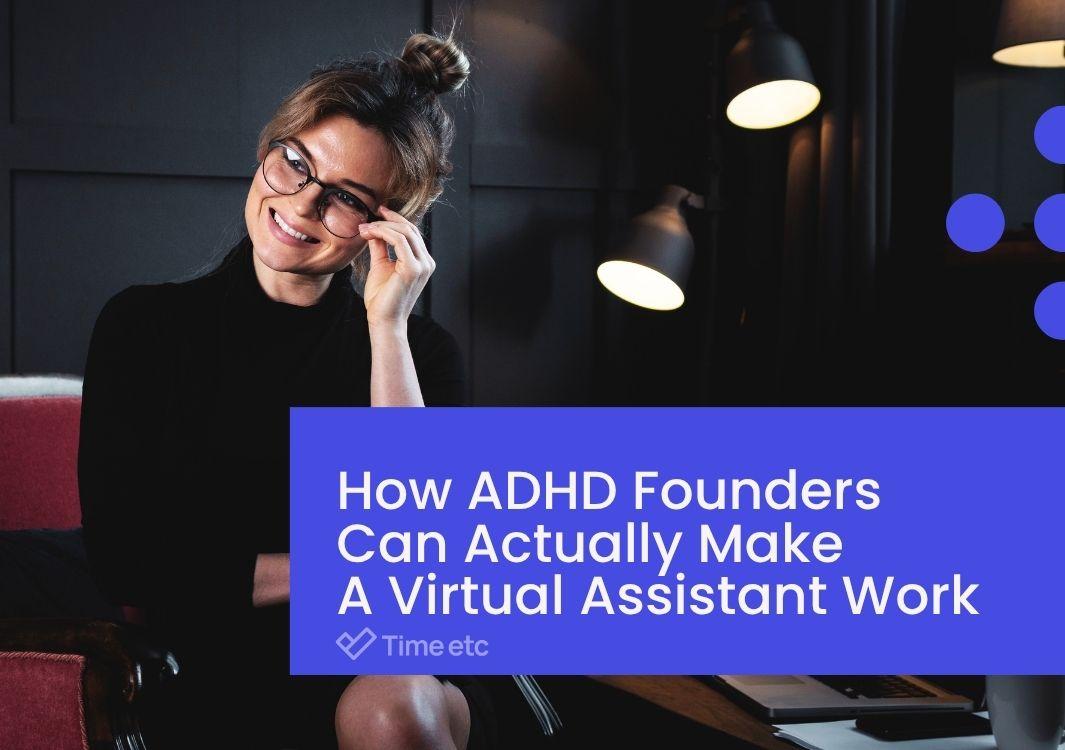If you're reading this, chances are, you know you need help. You've known for months, maybe years. Tasks are piling up, balls are dropping, and everyone keeps telling you that delegation is the answer. Just hire a VA, they say. It'll solve everything.
But something keeps stopping you.
Maybe you've started the process a few times. Maybe you can't figure out what you'd even ask an assistant to do because your task list exists in seventeen places (and also your head). Maybe you've started writing job descriptions three different times and never finished them. Or maybe you just have this nagging feeling that it just won't work for you, even though you can't quite explain why.
If this sounds familiar, you're not alone. And if you have ADHD (attention-deficit hyperactivity disorder), these aren't just normal hiring jitters.
The fact is, delegation is genuinely harder when you have ADHD. Not impossible, but harder. And pretending otherwise does nobody any favors.
The skills you need to share your workload are often the same ones ADHD directly affects: Knowing what to prioritize. Explaining information clearly. Remembering to check in. Following up on tasks. Maintaining consistent processes.
But this doesn't mean you have to go it alone forever. Nor does it mean your experience will be doomed from the start.
It just means you need a different approach.
Once you set things up in a way that matches how you naturally get things done, a virtual assistant can make an enormous difference.
Here's how you can get started...

Why virtual assistants work particularly well for ADHD founders
Before we dive into the how, we need to talk about the why.
Externalized executive function
If you have ADHD, you already know your brain plays by its own set of rules. It has nothing to do with a lack of discipline, care, or competence. In fact, you’ve probably worked twice as hard as most people to get to where you are now. It's actually all to do with how your brain handles executive functions: the mental processes around planning, prioritizing, starting tasks, and following through.
For people with ADHD, these executive function systems are unreliable at best and completely offline at worst.
This is where a virtual assistant becomes something much more valuable than extra hands.
They can remember the things you forget. They can initiate tasks you struggle to start. They can turn your brilliant, scattered thoughts into organized action.
The asynchronous advantage
Your assistant may not be with you in person, but the asynchronous nature of virtual support can be surprisingly ADHD-friendly.
You can send a rambling voice memo at 11 PM when inspiration strikes. You can fire off half-formed thoughts throughout the day. Your VA can sort through it all and turn chaos into clarity, which is much harder to do in real-time with an employee sitting across from you, expecting coherent instructions.
Delegation creates mini-deadlines
For many ADHD brains, urgency is the rocket fuel that gets things moving. But when everything feels equally urgent (or nothing does), things can get pretty sticky.
But handing tasks over to a virtual assistant creates “artificial deadlines” and social accountability—two powerful ingredients that turn vague intentions into real momentum. “We’re waiting on your 3 bullet points by 3pm so I can finalize the deck” is easier to act on than “remember to finish the deck.”
Structure without suffocation
Many ADHD business owners choose to start their own venture to escape rigid workplace systems—so it’s no surprise that traditional structures and management methods feel stifling. Virtual assistants can add just enough scaffolding—status boards, checklists, gentle nudges—to get things done and keep momentum going without locking you into rigid routines. It’s structure as a service: present when you need it, invisible when you don’t.

12 tasks that are game-changers to delegate if you have ADHD
For ADHD brains, the hardest tasks aren’t necessarily the most complicated. They are often the ones that add extra weight to your cognitive load and amplify the unique challenges of executive dysfunction, making even simple day-to-day tasks feel overwhelming.
These tasks below are especially powerful to delegate because they ease that pressure and give you more mental space for the work that matters.
For time blindness
If hours disappear, deadlines sneak up on you, or you consistently underestimate how long things take:
- Calendar management becomes transformative. Your VA doesn't just schedule meetings. They build in buffer time between calls, block focus time for your deep work, add travel time (yes, even the fifteen minutes it takes to walk to the coffee shop), and send you preparatory reminders the day before anything important.
- Meeting prep and follow-up takes time blindness out of the equation. Your VA can prep a briefing document before each meeting (who you're talking to, what you discussed last time, what you want to accomplish), then handle all the follow-up tasks afterward without you having to remember to do it.
- Deadline tracking across projects means someone else is watching the calendar while you focus on the work itself. They can send you milestone reminders, flag when projects are at risk, and create weekly "what's due soon" updates.
For task initiation
If you know exactly what needs to be done but can't seem to make yourself start:
- Breaking projects into smaller chunks removes the overwhelm that causes paralysis. Your VA can take "write Q4 strategy document" and turn it into "outline main sections," "draft introduction," "compile data for section two." Suddenly you have small, concrete next steps instead of one enormous mountain.
- Starting tasks for you might sound strange, but it works. Your VA can draft the first version of an email you're dreading, set up the document structure for a report, do the initial research, or create a rough outline. Starting is often the hardest part. Once something exists, your brain can engage with editing and improving it.
- Creating simple next-step reminders helps when you finish one task but can't figure out what to do next. Your VA can proactively send you messages like "You finished the client proposal. The next step is scheduling the presentation. What's your availability next week?"
For decision fatigue
If you get overwhelmed by small choices and end up procrastinating on the big stuff:
- Inbox triage and pre-sorting means you're not making decisions about every single email. Your VA can categorize: urgent items that need your immediate attention, things they can handle completely, items that need a quick yes/no from you, and everything else that can wait.
- Research and presenting curated options dramatically reduces decision fatigue. Instead of asking "where should we have the team retreat?" your VA researches options based on your criteria and presents you with three solid choices, each with pros and cons. You're just choosing between good options rather than starting from scratch.
- Handling routine decisions that don't actually need your input removes them from your mental load entirely. Your VA can schedule vendor calls, choose meeting times from your available slots, and make decisions within parameters you've set. No need to involve you in every small choice.
For working memory
If you forget conversations, lose track of projects, or struggle to remember what you said you'd do:
- Following up on your behalf means nothing falls through the cracks. Your VA tracks all the "I'll get back to you" promises you make and ensures they actually happen, even when you've completely forgotten about them.
- Tracking ongoing projects creates a single source of truth. Instead of trying to keep twelve different projects organized in your head, your VA maintains a dashboard you can reference anytime to see where everything stands.
- Creating status updates you can reference eliminates the "what was I working on?" problem. Regular summaries of what's in progress, what's been completed, and what needs your attention next keep you oriented without requiring you to remember it all.
See: 50 Tasks You Can Outsource To A Virtual Assistant To Save Time In Your Business

Setting up your VA partnership for success
Here's where most ADHD entrepreneurs can stumble: they try to delegate the way neurotypical advice tells them to, with formal task lists, detailed SOPs, and perfectly organized project management systems. Then they wonder why it feels impossible, and stick to doing everything themselves.
Start with brain-dump sessions, not task lists
In your first few weeks working together, you might find it easier to schedule a call (or send a long voice memo) where you just talk through everything that's on your mental to-do list. Everything. The big projects, the tiny tasks, the things you keep meaning to do, the stuff that's been nagging at you for six months.
Don't worry about organizing it. That's what you're hiring someone to help with. Your job is just to get it out of your head.
Your VA can then organize this brain dump into a working task list, categorize it all by priority or type, and start asking you clarifying questions about what matters most. This approach works with your ADHD brain instead of requiring you to do the executive function work before you can even delegate.
Take advantage of tools
Delegating tasks always sounds like a no-brainer in theory. But when it’s time to actually do it? And figure out what to delegate, where to start, and how to explain it? That’s a lot of steps for a brain that’s already juggling a dozen priorities.
As an ADHD founder, having the right tools at your disposal can make all the difference. And the good news is that there are tools out there designed to take that friction out of the equation.
That’s exactly why we built our To-Do List Optimizer and Task Ideas Wizard, as simple, low-effort ways to see what’s actually worth delegating, speed up the handover process, and keep things moving without needing to spend time on every detail.
- To-Do List Optimizer: Enter your regular task list and the tool will show you exactly which tasks can be handled by a virtual assistant and which ones should stay in your remit.
- Task Ideas Wizard: Answer a few simple questions and the wizard will set you up with personalized task ideas tailored to you and your business. The Task Ideas Wizard takes it a step further by creating clear instructions for your assistant, so they can jump in and get started right away.
Embrace "imperfect" delegation
You don't need to have everything figured out before you hand something over. It's okay to say, "I need to send an email to our clients about the schedule change, but I'm not sure exactly what to say. Can you draft something and I'll edit it?" Or "I think we need to reorganize the website navigation, but I can't quite articulate how. Can you look at it and suggest three different approaches?"
Done is better than perfect instructions that you never get around to giving.

Create "if this, then that" systems instead of relying on yourself to remember
For example:
- "If I get invited to a podcast, forward it to my VA who will handle all the coordination."
- "If a client email will take more than five minutes to respond to, drop it in the VA folder."
- "Every Monday morning, my virtual assistant reviews my calendar and preps briefings for all my meetings."
Instead of hoping you’ll remember to delegate later—and then forgetting about it entirely—these automatic habits help make sure everything gets covered.
Embrace voice memos and screen recordings instead of written instructions
Tools like Loom, Voxer, or even just your phone's voice recorder are game-changers for ADHD brains. You can explain something while you're thinking about it, talking through your thought process naturally, without the executive function burden of translating your thoughts into a formal written document.
A five-minute screen recording where you show your virtual assistant what you're thinking is worth ten perfectly formatted instruction documents that you'll never actually create.
Expect clarifying questions
You might give instructions that make perfect sense in your head but skip steps that aren't obvious to someone else. That's normal, not a failure. A good VA will ask questions. Frame this as helpful, not annoying, because it saves you from the task being done wrong and needing to be redone.
Build in regular check-ins that don't depend on you remembering to follow up
Choose a regular meeting or asynchronous check-in schedule that works for you, and let your VA drive it. When they regularly bring updates, questions, and progress summaries your way, you get built-in accountability without having to rely on your already overloaded memory to keep things moving.
Give your VA explicit permission to nudge you, remind you, and follow up with you
Many ADHD founders feel embarrassed about needing reminders, so they don't empower their assistants to provide them. But those reminders might be exactly what makes the partnership work. Your VA isn't judging you. They're supporting your executive function.
A simple message to your assistant could be: "Please don't wait for me to follow up on things. If you need something from me and haven't heard back in 48 hours, ping me again. I won't be annoyed. I'll be grateful."
Give your VA the green lights they need
Rather than relying on yourself to review every detail (and remembering to do it), set simple guidelines for when your virtual assistant can take action without waiting on you. Maybe they can approve small expenses, choose between two workable meeting times, or send routine emails independently. This removes the bottlenecks that usually pile up and keeps things moving even on your busiest weeks.
For example: "If it's under $100 and related to office supplies, just buy it. If it's a scheduling question and both options work for me, just pick one. For everything else, run it by me."

What's the bottom line?
You’ve likely heard suggestions like “get organized first,” “create a process,” or “set aside a whole day to document everything.” But if getting organized were that straightforward for you, you’d have done it already. The advice ignores the reality that building systems from scratch can feel overwhelming, confusing, or simply impossible when your attention and executive functions have other priorities.
What does help is finding a way to delegate that fits how you naturally operate. An assistant can help you sort scattered tasks, clarify priorities, and hold onto the details that slip through the cracks. They can support you in making decisions when everything feels equally urgent—or equally avoidable.
Delegation with ADHD isn’t about transforming yourself into a hyper-organized version of who you think you “should” be. It’s about creating a working relationship that steadies the parts of running a business that feel slippery or draining, so you have more energy for the work you’re actually here to do.
And yes, that kind of support is absolutely possible. Countless ADHD entrepreneurs, creatives, and leaders rely on it every day.
You’re not behind. You’re not broken. You’re not asking for anything unreasonable.
You’re simply ready for a better way to get help.
Want to get matched with your ideal virtual assistant?
Look no further than Time etc.
Since 2007, we've helped over 22,000 people just like you by connecting them with brilliant, experienced virtual assistants who take the weight off your shoulders and give you space to build the business (and the life!) you deserve.
Here’s what makes partnering with us different:
- A team that gets ADHD founders. Our entire service is designed to cut through the chaos and keep things flowing without friction.
- Access to 700+ pre-vetted, top-tier assistants. We match you with the right one (or more!) in days, not weeks.
- Total flexibility. Scale your support up or down whenever you need. No contracts, no stress.
- Top-tier security and data protection. Your data stays safe every step of the way.
- Huge cost savings. No need to fork out for full-time salaries, office space, benefits, or equipment.
- Hands-off management. We handle the training, oversight, and admin—you just get the results.
- More help when you need it. Add extra assistants to your team at no extra cost.
- A lifetime happiness guarantee. Because your success (and sanity) are our top priorities.
Ready to get started?
Speak to our expert team to let us know what you need, and we’ll handle the rest!
And don't forget, you can answer a few quick questions to get personalized task recommendations tailored to your needs—and enjoy $150 off your first month of virtual assistant support!












